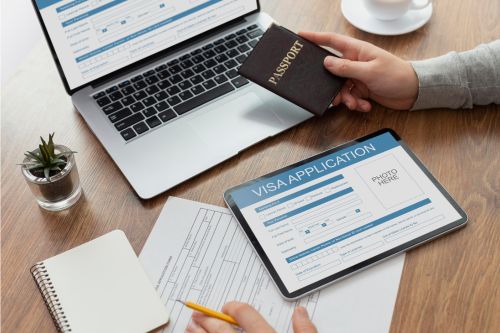Table of Contents
- MS abroad journey | A comprehensive roadmap for success
- 10 Steps to fast-track your MS abroad journey
- Step 1 | Self-assessment and goal setting
- Step 2 | Research your field and universities
- Step 3 | Understand admission requirements
- Step 4 | Financial planning and scholarships
- Step 5 | Prepare your application
- Step 6 | Visa application and documentation
- Step 7 | Accommodation and travel arrangements
- Step 8 | Orientation and integration
- Step 9 | Academic excellence and networking
- Step 10 | Post-graduation planning
- Key takeaways
- FAQs
MS abroad journey | A comprehensive roadmap for success
The decision to pursue a Master of Science (MS) degree abroad after completing a 3-year bachelor’s degree is a significant step in one’s academic and professional journey. It opens doors to a world of opportunities, but it also comes with its unique set of challenges. To successfully navigate this path, you need a well-structured roadmap. In this blog, we’ll provide you with a step-by-step guide to help you embark on your MS journey abroad.
10 Steps to fast-track your MS abroad journey
Following are key steps to fast-track your MS abroad journey after a 3-year bachelor’s degree
Step 1 | Self-assessment and goal setting
Before you start planning your MS abroad, take some time for introspection. Understand your academic and career goals. What field of study interests you? What are your long-term career aspirations? How will an MS degree help you achieve them? Answering these questions will help you make decisions throughout your journey.
Step 2 | Research your field and universities
Once you clarify your goals, start researching your chosen field of study. Look for universities that offer MS programs aligning with your interests and career goals. Consider factors such as program reputation, faculty expertise, available resources, and opportunities for research or internships. Websites, forums, and educational portals can be valuable resources for gathering information about universities and programs.
Step 3 | Understand admission requirements

Each university may have different admission requirements. It’s essential to familiarize yourself with these requirements early on to ensure you meet them. Common requirements may include-
- A bachelor’s degree (equivalent to a 3-year degree).
- Standardized test scores (e.g., GRE, TOEFL, or IELTS).
- Letters of recommendation.
- A well-crafted statement of purpose (SOP).
Ensure you meet the academic and language proficiency criteria and start preparing for standardized tests if necessary. Seek guidance from mentors or academic advisors when submitting your application.
Step 4 | Financial planning and scholarships
Financing your MS abroad can be a significant concern. Research various funding options, including scholarships, grants, assistantships, and loans. Many universities offer scholarships specifically for international students. Start your scholarship search early, as competition can be intense.
Create a budget that considers tuition fees, living expenses, and other costs associated with studying abroad. Explore part-time work opportunities but be cautious about balancing work and academics.
Step 5 | Prepare your application
Craft a compelling application that showcases your academic achievements, skills, and motivation. Your application typically includes-
- Transcripts and degree certificates.
- Standardized test scores.
- Letters of recommendation.
- Portfolio of past work experiences.
- Resume or curriculum vitae (CV).
- Admission essay
Ensure that your application materials are well-organized, error-free, and tailored to each university’s requirements. Seek feedback from professors or mentors to improve the quality of your application.
Step 6 | Visa application and documentation

Once you receive an admission offer, you’ll need to apply for a student visa. Research the process of visa application for your chosen destination and gather the required documents, which may include-
- Duly filled out passport and visa application form.
- Proof of financial means.
- Admission letter.
- Passport-sized photos.
- Visa application fee.
Start this process well in advance to avoid any last-minute complications.
Step 7 | Accommodation and travel arrangements
Secure accommodation for your stay abroad. Most universities offer on-campus housing options for international students, but you can also explore off-campus housing. Research the cost of living in your chosen destination and plan your budget accordingly.
Book your flight tickets and make travel arrangements in advance. Ensure you have the necessary travel insurance and are aware of any travel restrictions or requirements.
Step 8 | Orientation and integration
Once you arrive at your destination, attend all the orientation sessions organized by the university. These sessions will help you acclimate to the new environment, understand academic expectations, and connect with fellow international students.
Take proactive steps to understand the local culture and community. Join clubs, participate in events, and try to build a network of friends and mentors.
Step 9 | Academic excellence and networking
Throughout your MS program, prioritize academic excellence. Engage actively in classes, seek research or internship opportunities, and maintain regular communication with professors. Attend conferences, seminars, and workshops related to your field of study. Building a professional network can open doors to research collaborations and job opportunities.
Step 10 | Post-graduation planning
As you approach the end of your MS program, start planning your next steps. Explore post-graduation job opportunities, either in your host country or back in your home country. Update your resume and job portal profiles and seek guidance from career services offered by your university.
Key takeaways
- Pursuing an MS abroad after a 3-year bachelor’s degree is a rewarding endeavor that offers numerous opportunities but requires meticulous planning and preparation.
- Understand and fulfill admission requirements, including standardized tests, recommendation letters, and a well-crafted statement of purpose.
- Craft a compelling application that showcases your achievements, skills, and motivation, tailoring it to each university’s requirements.
- Prioritize academic excellence throughout your MS program, actively engage in classes, and build a strong professional network.
We hope you found this blog insightful. Share your thoughts in the comments section below. We’d love to hear from you! Ready to embark on your study abroad journey? Contact us today to explore more about pursuing international courses. Our team is here to assist you every step of the way!
Liked this blog? Read next: Western New England University | A glimpse into student life!
FAQs
Q1. Is a 3-year bachelor’s degree accepted for a master’s in Canada?
Ans- Some Canadian universities will accept a three-year bachelor’s degree. The educational institutes accepting students with 3 years bachelor’s degree are the University of Toronto, the University of British Columbia, York University, the University of Manitoba, Ryerson University, Vancouver Island University, HEC Montreal, Thompson Rivers University, and the Schulich School of Business.
Q2. Which country is best for studying MS?
Ans- The greatest nations for pursuing a master’s degree abroad include the United States, United Kingdom, Canada, Australia, Germany, France, and Ireland. International students prefer these countries for their high-quality education, global exposure, and well-paying career possibilities.
Q3. What is the salary of MS graduates abroad?
Ans- MS graduates in the United States earn an average of 94,000 USD (70.4 lakh INR) annually. STEM courses in the US offer more opportunities than other study fields.






